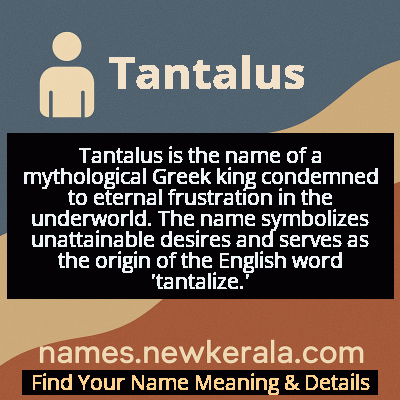Tantalus Name Meaning & Details
Origin, Popularity, Numerology Analysis & Name Meaning of Tantalus
Discover the origin, meaning, and cultural significance of the name TANTALUS. Delve into its historical roots and explore the lasting impact it has had on communities and traditions.
Name
Tantalus
Gender
Male
Origin
Greek
Lucky Number
9
Meaning of the Name - Tantalus
Tantalus is the name of a mythological Greek king condemned to eternal frustration in the underworld. The name symbolizes unattainable desires and serves as the origin of the English word 'tantalize.'
Tantalus - Complete Numerology Analysis
Your Numerology Number
Based on Pythagorean Numerology System
Ruling Planet
Mars
Positive Nature
Generous, passionate, energetic, and humanitarian.
Negative Traits
Impulsive, impatient, moody, and can be overly emotional.
Lucky Colours
Red, maroon, scarlet.
Lucky Days
Tuesday.
Lucky Stones
Red coral, garnet.
Harmony Numbers
1, 2, 3, 6.
Best Suited Professions
Military, sports, philanthropy, leadership roles.
What People Like About You
Courage, energy, leadership, generosity.
Famous People Named Tantalus
Tantalus of Lydia
Mythological King
Ruler who committed heinous crimes against the gods and was punished eternally in Tartarus
Tantalus (son of Thyestes)
Mythological Figure
Son in the cursed House of Atreus, killed by his uncle Atreus and served as a meal to his father
Tantalus (son of Broteas)
Mythological Figure
Grandson of the original Tantalus, continuing the family's tragic legacy
Name Variations & International Equivalents
Click on blue names to explore their detailed meanings. Gray names with will be available soon.
Cultural & Historical Significance
The Tantalus myth explores profound themes of mortal limitations, the consequences of testing divine boundaries, and the nature of eternal punishment, influencing Western literature, psychology, and philosophy for millennia. His story serves as a cautionary tale about the dangers of overreaching ambition and the importance of respecting natural and divine laws. The cultural impact extends beyond mythology into modern psychology, where 'tantalizing' describes any situation where desired objects remain frustratingly out of reach, and into literature where his torment has been referenced by writers from Homer to contemporary authors.
Extended Personality Analysis
Individuals named Tantalus are often perceived as ambitious, intellectually curious, and prone to testing boundaries, reflecting the mythological figure's daring nature. They may possess a charismatic leadership quality combined with a tendency toward risk-taking behavior, mirroring the original Tantalus's royal status and his willingness to challenge divine authority. This personality type often exhibits strong willpower, strategic thinking, and a desire to achieve what others consider impossible, though this can sometimes manifest as recklessness or disregard for conventional limits.
However, this name also carries warnings of potential hubris, overreaching ambition, and the consequences of transgressing ethical limits. The personality associated with Tantalus suggests someone who might struggle with temptation and the pursuit of unattainable goals, yet possesses the intelligence and determination to achieve remarkable things if they can balance their ambitions with wisdom and respect for boundaries. There's often a paradoxical combination of great potential and self-destructive tendencies, making the personality complex and potentially tragic if not tempered with self-awareness and ethical consideration.
Modern Usage & Popularity
In contemporary times, Tantalus remains an extremely rare given name, primarily used in academic, literary, or mythological contexts rather than for actual children. The name appears occasionally in fantasy literature, video games, and scientific terminology (the chemical element tantalum derives from Tantalus), but its association with eternal torment and horrific crimes makes it generally unsuitable for modern naming practices. Some bold parents interested in Greek mythology might consider it for its strong classical roots and unique sound, but most opt for less burdened mythological names like Orion or Perseus. The name's usage has remained consistently minimal throughout modern history, with no significant popularity trends or regional concentrations, making it one of the most uncommon mythological names in contemporary use.
Symbolic & Spiritual Meanings
Tantalus symbolizes the human condition of desire and frustration, representing the eternal pursuit of unattainable goals and the psychological torment of being perpetually close to satisfaction yet never achieving it. The name embodies themes of divine punishment, the consequences of hubris, and the boundaries between mortal and divine realms. Metaphorically, Tantalus represents any situation where what one desperately wants remains just out of reach—whether in love, ambition, knowledge, or material success. The symbolism extends to modern psychological concepts of frustration, delayed gratification, and the human tendency to desire what cannot be obtained, making the name a powerful representation of existential struggle and the limits of human attainment in both personal and philosophical contexts.

